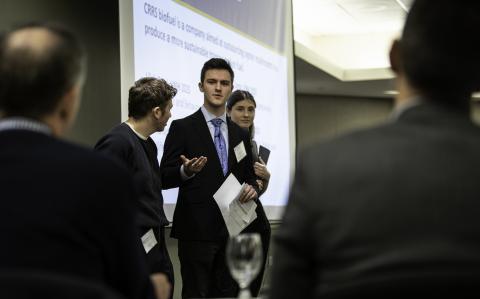Leveraging the Resources at Sustainability Institute for More Effective Teaching of a Sustainability Course

Universities are among the most influential actors in the world because we shape the mindset and competence of future leaders, entrepreneurs, and citizens.
Worsening climate change, exacerbated social and economic inequities, and the double-edged effects of big data and smart technologies have accentuated the need for universities to embed sustainability more deeply in our curriculum within and across colleges by, among others, offering new sustainability-focused courses and experiential learning activities.
Responding to this urgent need and as part of the long-term strategic initiative to focus more on sustainability, Peter T. Paul College of Business and Economics became a signatory of the United Nation’s Principles of Responsible Management (PRME) in 2021 and started to measure, enhance, and monitor the extent to which we are incorporating sustainability in our teaching, research, and community partnerships.
One example of enhancing the sustainability content in Paul College’s curriculum is the offering of a brand-new course on Sustainability and Marketing in Spring 2023, and I am very fortunate to have the opportunity to teach this course to an inaugural cohort of 30 students. Business sustainability is a highly complex topic to teach. To achieve the course learning objectives, it is crucial to not only present key concepts, principles, and decision frameworks in the field of business sustainability, but also offer plenty of experiential learning activities such as case analysis, guest speakers, mini workshops, social innovation brainstorming sessions. Effective use of experiential learning activities could greatly increase student engagement, stimulate creativity, and cultivate higher-level sustainability expertise. According to Bloom’s Taxonomy, there are six levels of cognitive complexities – remember, understand, apply, analyze, evaluate, and create. Experiential learning activities are uniquely effective for cultivating higher-level expertise such as the ability to apply, analyze, evaluate, and create. It is the higher-level expertise in the domain of sustainability that will enable our students to drive positive change in the business world – dramatically reducing businesses’ carbon footprint and increasing the triple bottom line of businesses.
When searching for experiential learning activities, I came across numerous teaching resources offered by the Sustainability Institute, ranging from Changemaker Speaker Series, Social Venture Innovation Challenge (SVIC), to B Impact Clinic, Carbon Clinic, Semester in the City, and many others. After talking with my colleague Dr. Fiona Wilson, the director of Sustainability Institute, I incorporated a range of experiential learning activities offered by the Institute in my sustainability course. For example, I assigned the online UNH sustainability learning module, a series of 10 short videos showcasing various aspects of UNH’s sustainability performance. Prior to watching the videos, students had very low awareness, or only vague knowledge, of UNH’s sustainable practices, so watching the videos really drives home the message about the long-term commitment of UNH to sustainability. Students are also required to attend the Changemaker Speaker Series this spring – one is about transition to

Students present their ideas at the 2022 NH Social Venture Innovation Challenge to a panel of distinguished judges.
Sustainable Energy, and the other is about careers for sustainable change. Another noteworthy aspect of the course is that I modeled the group project based on Sustainability Institute’s signature program, SVIC. Rather than doing a conventional team project, students in this class will do a deep dive into a specific social or environmental issue and develop an innovative business idea to tackle this issue. Students will present their social issue research and business innovation in the UNH URC Sustainability Research Symposium in April. The benefits of utilizing the learning resources at Sustainability Institute are many. The materials are well designed and ready to be deployed; the events are expertly curated and reflect multidisciplinary perspectives and latest industry trends; the project has been fine-tuned, with plenty of supporting resources. These experiential learning activities are so complementary to the principles, theories, and mindset of sustainability that I intend to instill among my students in this course. Thanks to these resources, my newly designed course is more student-centered, more innovative, and has a nicer blend of theory and practice.